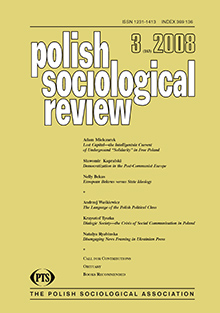Dialogic Society-the Crisis of Social Communication in Poland
Dialogic Society-the Crisis of Social Communication in Poland
Author(s): Krzysztof TyszkaSubject(s): Social Sciences
Published by: Polskie Towarzystwo Socjologiczne
Keywords: social communication; dialogic society; monologic society; dialogue; individualism
Summary/Abstract: This article attempts to diagnose social communication in post-1989 Poland. It analyses the issue against the larger backdrop of the most familiar communication theories formulated by representatives of the contemporary humanities (Mikhail Bakhtin’s theory of creative discourse, Lyotard’s dialogue as the differentiation of rationality, Waldensfels’s category of understanding and communication,Charles Taylor’s communitarianism). Another important reference point in addition to these theoretical conceptualisations is the philosophy of Józef Tischner who devoted many of his essays to dialogue in Polish social life, both in communist times and after the fall of the communist regime. The author proposes a diagnosis of the crisis of social communication in Poland. This crisis is rooted in the weakening of community bonds and the resulting lack of foundations on which dialogic society, based on trust and receptiveness to new experiences and ideas, the prerequisites for civil activity, could be constructed. Two forms of communication have taken its place: individualistic communication (the individual’s world is constricted to personal experiences) and collectivistic communication (the individual unreflectively accepts the current social stereotypes and views them as obvious truths). Such an attitude leads to the development and fortification of the “culture of distrust” syndrome with its extremely significant social consequences. This is particularly visible in the context of the quality of public debate and the relations between the government and society. Such phenomena as poor voter turnout, negligible participation in voluntary associations, lack of confidence in the authorities and interpersonal relations are all symptoms of the crisis of social communication.
Journal: Polish Sociological Review
- Issue Year: 163/2008
- Issue No: 3
- Page Range: 297-309
- Page Count: 12
- Language: English

